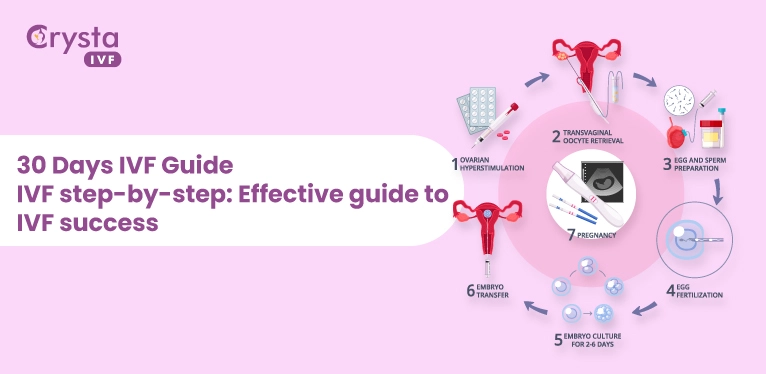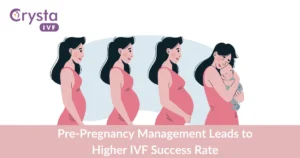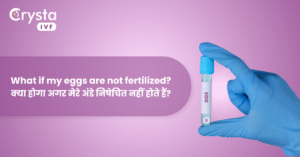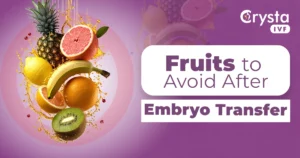The decision to undergo an IVF (In-Vitro Fertilization) treatment is an exhilarating, overwhelming, and emotional journey to be on. It’s a thrilling game of “hurry up and wait” in the short arrangement of activities. It’s stirring when your cycle finally begins, and you get the green light to start medication!
After years of trying, when you visit a fertility centre for your first round of IVF treatment, the excitement is real and nothing less than that of being on cloud 9. One cannot touch your level of happiness and excitement!
It goes without saying that going through infertility is nothing less than a roller coaster ride. Still, the good thing is, becoming parents is possible with the advancement of infertility treatments like In Vitro Fertilization (IVF) Intrauterine Insemination (IUI) etc.
According to the World Health Organization (https://www.who.int/health-topics/infertility), infertility affects over 15% of couples of reproductive age globally. However, for both partners, environmental and lifestyle regimens like excessive smoking, alcohol consumption, obesity, and exposure to harmful chemicals and environmental pollutants have been linked with lower fertility rates.
If you’re planning to get pregnant and have exhausted all other fertility options, IVF is often your go-to option to have a biological baby.
IVF is an Assisted Reproductive Technology (ART) procedure in which the eggs are fertilized with sperm outside a woman’s body in a specialized fertility laboratory. The fertilization resultantly gives you an embryo.
Then, the prepared embryo is either frozen or transferred to the uterus, expecting a positive pregnancy.
Couples undergoing or preparing for IVF experience various emotions from the start of the treatment until the completion of the entire process. Anxiety, nervousness, and uncertainty are common phenomena that couples or parties involved in IVF experience. After all, IVF is time-sensitive, can be physically, financially and emotionally demanding— all for a chance at achieving conception.
It all feels surreal when IVF specialists approach you, telling tales of previous cases of IVF success and showing you adorable photos of babies born out of IVF procedures and nurses giving you detailed instructions about the treatment and medications etc.
Fertility triggering shots can sometimes take a toll on your physical as well as mental health. During fertility treatments, a woman’s body may undergo several changes due to ovarian stimulation shots for around 14 days.
The 30 days following the beginning of the treatment are crucial until the completion of an IVF cycle, and it is important to keep your body healthy and well-prepared for the entire and lengthy medical procedure.
Here, we have come up with complete fertility treatment or IVF guide for all planning to or already undergoing IVF treatment to fulfil their parenthood dreams. Through this guide, your entire IVF journey will go smoothly and effectively.
Follow our 30-day complete IVF guide, trust your treatment success and follow your instincts for IVF success.
IVF Procedure Step By Step
IVF treatment involves different stages and steps. Many times, couples need to undergo more than one IVF cycle to achieve success. You can also enhance IVF Success Rate with Pre-Pregnancy Planning to better chances of getting positive results.
Here, we have segregated different stages of IVF, which includes the duration of each cycle and what each one results into.
Preparing for IVF
The IVF preparation starts 2 to 4 weeks before getting started with the IVF cycle. It includes making certain lifestyle changes to ensure your body is healthy and ready to accept the changes for the hormonal medications and other treatment procedures.
Women are sometimes recommended by their experienced IVF specialists, fertility drugs, and injections to regularise their menstrual cycle. This helps in preparing the body for the rest of the treatment process.
IVF Stage 1
Stage 1 usually consumes a day. The beginning of your IVF cycle or the first day of your menstruation is generally close to your scheduled timing of the IVF treatment. Thus, it is important to keep a close check on your upcoming period, and it is going to matter a lot!
IVF Stage 2
Stage 2 of an IVF cycle lasts between 3 and 12 days as you are put on fertility triggering medications that help ovarian stimulation. This helps the ovaries to release more eggs than usual.
IVF Stage 3
At stage 3 of an IVF cycle, injectable hormonal medications are given that stimulate the ovaries to release the eggs.
You are then called to the fertility facility by your IVF specialist. At this stage, eggs are collected or retrieved by the specialists for further processes.
Stage 4
Stage 4 involves a day and is divided into two parts. The male partner (or a sperm donor) will have already provided sperm or will provide it while you’re having your eggs collected.
Then, the fresh eggs are fertilized within the following hours. This is when you’ll be given a hormone known as progesterone.
This hormone helps prepare the womb to carry a healthy pregnancy and decreases the chance of a miscarriage.
Stage 5
Within a week after collecting the eggs, the healthy embryo will be transferred back into the uterus. This is done via a non-invasive process, and it is not painful.
Stage 6
At this stage, patients are called at the IVF centre to examine with the help of scans if the uterine environment accepts the little seedling well and if everything is going well in the uterine environment. IVF doctors may also perform blood tests to evaluate and examine the pregnancy hormone levels.
Lifestyle tips for IVF
Making certain healthy lifestyle changes can boost your chance of conceiving and having a healthy baby. Here we have covered some lifestyle changes that you can adopt to make your body adaptable to activities that take place during and after the IVF cycle.
Eating habits during IVF
It is important to take extra and special care of your dietary habits by consuming healthy and balanced meals during an IVF cycle. Going gluten-free or vegan during this transitional phase of your life is not a good idea for your reproductive or fertility health.
For a healthy and successful conception, both men and women need a good blood supply, which lets in more nutrients, oxygen, and hormones to optimize the reproductive organs’ functioning. The antioxidant volume of the semen and the fluid and cells surrounding the egg deteriorates with age and is inferior in individuals with poor sperm and egg quality. Effective oxidants surge with age and could be gathered from consuming foods cooked at a high heat like eating food with grilling and barbecuing and with increased blood sugar levels, as with overweight individuals or extreme sugar consumption. In the male, oxidation products associate with poor semen parameters, specifically motility, and also correlate with the crumbling of the sperm DNA. In females, oxidation products associate with less viability of the granulosa cells, which edge and nurture the egg. A diet rich in antioxidants like berries and a healthy balanced diet would effectively change before planning pregnancy.
According to medical experts, couples or women who conceive via Assisted Reproductive Technology (ART) procedures can adopt a Mediterranean-style diet. The Mediterranean diet is high in vegetables, fruits, beans, cereals, legumes, nuts, grains, fish, and unsaturated fats like olive oil. It generally includes low consumption of meat and dairy foods.
According to certain research studies, a Mediterranean diet can enhance IVF treatment success rates in IVF patients under 35 years old and who are not obese and have a maintained BMI.
A well-managed and balanced diet affects male fertility; it is important to inspire the male partner to follow the Mediterranean diet.
Give your diet regime a new look every day with the following diet pattern:
- Add fresh fruits and green leafy vegetables to your diet
- opt for lean proteins, like fish and poultry.
- Eat whole grains, like quinoa, farro, and whole-grain pasta.
- Add in legumes, including beans, chickpeas, and lentils.
- Switch to low-fat dairy products.
- Eat healthy fats, such as avocado, extra-virgin olive oil, nuts, and seeds.
- Avoid red meat, sugar, refined grains, and other highly processed foods.
- Cut out salt. Flavour food with herbs and spices instead.
How to work out during IVF
Staying active and healthy when you are planning to or already undergoing IVF treatment plays a crucial role in getting high IVF success rates. Getting regular exercise can help in enhancing fertility in various ways, and it helps with weight management, immunity-boosting, hormone balance, blood circulation, and metabolism. Thus, it might come as a wonder that workout and fertility treatments don’t always mix.
During IVF or other fertility treatments, it is of utmost importance to balance exercise and fertility. It is important to understand that ‘how much workout is too much for fertility’?
While your infertility specialist may give you the go-ahead for a workout during parts of an IVF treatment cycle, one should refrain from working out at certain points. Some IVF experts advise not exercising at all during the time of egg retrieval. During that stage of the IVF cycle, the ovaries are enlarged from being stimulated, and workouts may encourage the risk of a rare condition known as ovarian torsion.
Endocrine disruptors and chemicals to avoid during IVF
Fire retardants, plastics and cosmetic products are considered endocrine disruptors that are harmful to IVF patients. If you want your IVF cycle to be successful, it is important to stay away from these EDCs.
According to the studies, endocrine disruptors affect:
- Male and female hormones
- Reproductive health of both the partners
- Prenatal development
- These not not suitable for your overall health
The Endocrine Society Trusted Source has affirmed these listed chemicals cause “substantial concern to human reproductive and overall health.” IVF experts recommend checking the products you use most and moving to more natural alternatives.
- Chemicals to avoid
- Cosmetic products
- Moisturizers
- Soap
- Stain-resistant materials
- Non-stick cooking utensils
- Dioxins
- Meat
- Dairy products Food-packaging substances
- Brominated flame retardants
- Furniture and its polish
- Clothing
- Methanal
- Nail paint
- Parabens, triclosan, and benzophenone
- Electronics
- Yoga mats
- Perfluorinated compounds
Medications to avoid while being on fertility drugs
As you prepare to start your IVF cycle, tell your fertility doctor about any medications you take. Make sure to list everything, even the most ordinary drug, like:
- A routine allergy drug
- Acetaminophen (Tylenol) or ibuprofen (Advil)
- Over-the-counter (OTC) supplements
Some medicines could:
- Intervene with fertility drugs
- May lead to hormonal imbalances
- Make IVF treatment less active
The type and kind of chemicals are the most important to avoid during an IVF cycle. Ask your fertility specialist if it’s feasible to advise alternatives of thee during your IVF cycle and even during pregnancy.
Medications to avoid during fertility treatment
Medical prescriptions and OTC nonsteroidal anti-inflammatory drugs (NSAIDs), such as aspirin, Advil, Motrin, Midol, naproxen (Aleve), anti-depressants and other mental health conditions, like anti-anxiety pills etc. Apart from these, one should avoid consuming:
- Steroids
- Antiseizure drugs
- Thyroid medicines
- Skin products containing estrogen or progesterone
- Chemotherapy medications
Important supplements during IVF
There are certain natural supplements one can consume to help support a pregnancy.
Add a prenatal vitamin in the 30 days (or even several months) before you plan to begin your IVF cycle to enhance your folic acid. It is an important vitamin to protect the brain and spinal congenital disabilities in evolving fetuses.
Prenatal vitamins can even help the male partners boost their sperm and overall fertility health. To encourage and improve embryonic development, IVF experts recommend fish oil.
If your vitamin D levels are low, it is important to have vitamin D supplements before your IVF cycle begins. Low levels of vitamin D in the maternal side may be linked to autism, sources said.
How many hours of sleep to get during IVF?
Sleep and fertility have close connections. Getting the right amount of sleep helps a lot throughout your IVF cycle.
The National Sleep Foundation conducted a study on sleep and women undergoing IVF. The study discovered that women who were undergoing IVF and used to get seven and eight hours of sleep could get 25% more successful in achieving conceiving than those who got nine hours of sleep every night. Those who got fewer than seven hours were 10-15% less likely to achieve conception.
The following points are important to be considered for a healthy pregnancy:
- Sleep patterns affect hormones.
- Apart from impacting mood and productivity, sleep also affects women secrets throughout their menstrual cycle. Getting 7-8 hours of sleep leaves a positive impact on the levels of a woman’s progesterone, Leptin, estrogen and Follicle-Stimulating Hormones (FSH). All of these hormones are important for achieving and carrying a pregnancy to full term.
- Going to bed early one night, then not sleeping until dawn can affect your body clock. Try to go to bed early and wake up at the same time every day! Try to have a consistent sleeping pattern.
- Have a stern “no screens” rule for 30 minutes before sleeping. Put your mobile, remote etc., in a drawer, if necessary, before going to bed.
- It is important to limit alcohol and caffeine to at least 7 hours before going to sleep.
IVF and Intercourse timing
It is completely okay to have Intercourse while you are on your ovarian stimulation. However, there may come a point during the IVF cycle when it becomes challenging to have Intercourse.
At this time, the ovaries are expanding and getting larger, making it challenging at times. If that is the case, then refrain from Intercourse. The fact of the matter is that listen to your body! If you feel alright, go for it!
We do ask that after your embryo transfer, you refrain from intercourse until the final pregnancy test.
Can you drink alcohol during IVF?
Undergoing IVF can be challenging at times. You may want to take the help of a drink to ease your burden. If so, you will be relaxed to know that drinking in moderation is possible during IVF. With this, it is important to understand that drinking may negatively affect the IVF outcomes depending on case to case.
Medical experts also recommend quitting alcohol completely after embryo transfer to improve the chances of a successful conception. Then with alcohol, after embryo transfer or once you have conceived, there is always apprehension with fetal alcohol syndrome. But a glass of wine or caffeine with a full stomach is not a concern.
What to do for IVF symptoms
As impulsive as an IVF cycle can be, one thing’s constant: countless physical symptoms.
Depending on case to case, each IVF cycle differs from another, so there’s no sure way to know which side effect you’ll get on any given day of any given IVF cycle.
Here are some ways to manage or even beat the side effects of fertility drugs.
- Bleeding or light-spotting
- Call your IVF expert immediately if bleeding or spotting takes place during the cycle.
- Light bleeding or spotting after egg retrieval is usual. Heavy bleeding is not.
- Refrain yourself from using tampons.
- IVF specialists also suggest that patients get ready to experience the toughest period of their life post an IVF cycle because the hormones help eggs develop and help thicken the endometrial lining.




